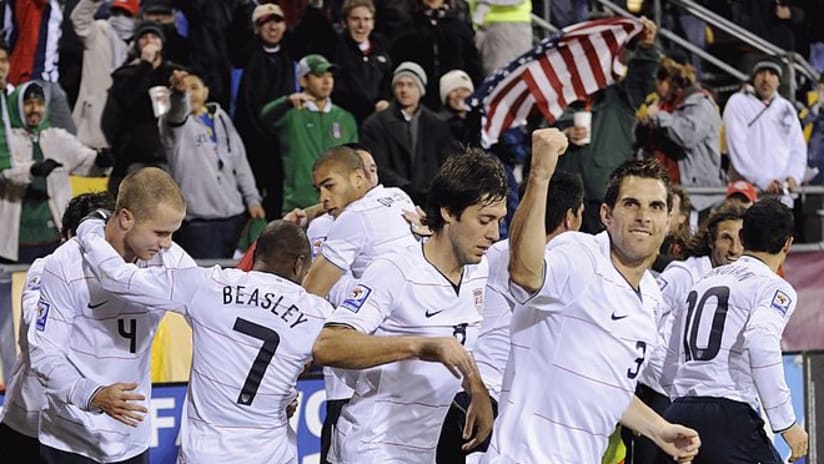History, geography and sociology have long dictated the soccer rivalry between the U.S. and Mexico. And while it’s always been somewhat heated, only in the last 20 years has it been anywhere near an even affair.
The numbers clearly reflect it as Mexico held a daunting 28-6-9 edge over its neighbors to the north prior to the turn of the century. And while the U.S. went winless against Mexico in the final seven matchups of the 1990s, one result in that span, the 0-0 World Cup qualifying draw at Estadio Azteca in 1997, set a course correction in the series that has pushed the U.S. to a 13-6-5 record against its rivals since the turn of the century.
In that match, the U.S. earned its first result in Mexico’s vaunted soccer cathedral, despite playing a man down for nearly an hour after defender Jeff Agoos was sent off for an altercation with Pavel Pardo in the 32nd minute.
“We showed a lot of resolve in that match,” said Cobi Jones who went 56 minutes that day. “Either at the youth or full team level, a lot of us had been part of tough results against Mexico, but the experiences gained built towards us earning a historic result that day.”
An unused substitute in that match as he was beginning to carve out his role in the U.S. team, forward Brian McBride says the result gave the team confidence, but also earned the team recognition where they didn’t have it before.
“The last 15-20 minutes the Mexican fans are jeering Mexico when they have the ball and actually cheering us on,” said McBride. “The first time we actually heard it in that game, we all looked at each other and said, ‘what’s happening?’ At that moment, we all said that Mexican fans respect U.S. Soccer, whereas before there wasn’t a lot of respect. I think that translates into our attitude, how we went about handling them. It affirmed it, once you get affirmation, we continued to grow.”
Under the guidance of former head coach Bruce Arena, the U.S. opened up the new millennium with two friendly wins against Mexico, building momentum towards a home World Cup qualifying match in Columbus, Ohio, on Feb. 28, 2001, and the start of a great U.S. Soccer tradition.
The smaller confines of Columbus Crew Stadium (now MAPFRE Stadium) and a kickoff temperature of 28 degrees combined to give the U.S. a significant home-field advantage, but things didn’t go to plan early on.
Though not malicious, in his debut as a villain to American fans everywhere, Mexican midfielder Rafael Marquez clashed heads with McBride on a 50/50 challenge at midfield, causing the starting U.S. forward to make way for Josh Wolff early in the match.
There was little question about Marquez’s intent in the 36th minute, when in a sign of things to come, the future Mexico captain came through with a late, high challenge to chop down Wolff as he streaked through the midfield.
“I think I’m still feeling that foul,” Wolff joked. “Guys like Rafa and Claudio Suarez; there was viciousness with those games and violence at times.”
Though Wolff was alright, just before halftime, U.S. captain Claudio Reyna pulled up with a groin injury and Wolff’s childhood friend Clint Mathis also entered the match.
In what would become both players’ coming out party on the national team stage, Mathis sent a cutting ball over the Mexico backline and into Wolff’s stride. The 23-year-old ran on, evaded goalkeeper Jorge Campos who’d come well out of his box and tapped into an empty net to take the score to 1-0.
“I’m sure they weren’t that worried about me or Clint coming in as reserves,” said Wolff, who was making just his fourth U.S. appearance in the match. “I was younger, had played against the Mexican youth national teams and had a good experience with the Olympic team, but I wouldn’t expect them to know that much about me or Clint, outside us being young players that are just breaking in.”
Late in the match, Wolff beat two Mexican defenders on the right before breaking into the box and centering for Earnie Stewart who finished from 12 yards out, creating the first of four staple “Dos a Cero” score lines in home World Cup qualifying matches against Mexico.
The victories over Mexico and the belief Bruce Arena instilled in his team built towards the rivalry’s biggest match to date in the Round of 16 at the 2002 FIFA World Cup.
“When we knew we were playing them, we were overjoyed,” McBride said. “We knew them and we knew we could beat them. Any given day, anyone can beat anyone, but we were very happy to see them.
“Bruce has a confidence,” he continued “The way he goes about himself, it rubs off on you. He made some changes, moved things around all with the idea we were going to get the result.”
Perhaps remembering Wolff’s breakout performance 14 months earlier, one of Arena’s changes was starting Wolff, who’d played just eight minutes in the group stage, up top with McBride.
It took the forward tandem just eight minutes to link up for the game’s first goal as McBride quickly played a restart for Reyna on the right. The captain charged towards the end line before playing a square ball for Wolff who used the outside of his right boot to lay off what McBride called “the most perfect ball for a first-time strike”, as the veteran forward buried it past Oscar Perez for a 1-0 lead.
Chief among players Mexico would deem a villain, Landon Donovan would score the most significant of his six against El Tri off a cross from Eddie Lewis in the second half to take things to 2-0.
As time went on, the U.S. style of play, sitting in then springing quick counter attacks, frustrated Mexico throughout the match, and that’s where Jones earned his hero status in the rivalry.
Having played a mostly substitute role in his final years with the national team, Jones’s fresh legs kept pressure all over the field in the mid-day sun. He hadn’t been on for 10 minutes before Marquez played U.S. villain again, this time as Jones went up for a free header, the Mexican captain led with his studs up into Jones’ torso, before delivering a vicious head butt to the veteran winger.
Marquez immediately saw red, one of five in his international career and the first of two against the United States, while the dismissal effectively ended any chance Mexico had at a comeback.
“That was the moment where that all started with him,” Jones said. “He’s the captain of the team. He’s played at big clubs before and since, but he’s never known how to handle the high pressure situation of playing his arch-rival on the international stage and losing. That was the big issue for him and we see how he reacted to it.”
Moments later as Jones took the ball into the corner to kill off stoppage time, both Salvador Camona and Sigifredo Mercado came through and stomped on both of Jones’ legs.
“You could see the frustrations in their players because they couldn’t find a way to beat us,” Jones said. “Luckily, the referee blew his whistle not too long after.”
While the U.S. players celebrated a first trip to the World Cup quarterfinals, sportsmanship didn’t exactly rule the post-match festivities, as most Mexican players walked directly off the field.
“We were also ticked off at the fact that they weren’t necessarily respectful in loss,” McBride remembered. “There were plenty of times where we lost games where we thought we should have done better in, but still we never tried to injure anybody, never tried to not shake hands. That part was disappointing. Having said that, it’s the heat of the moment - a huge game for them and for us of course, and I saw some of the guys a month later and they were awesome.”
With the U.S. and Mexico once again returning to Columbus, Ohio to renew their rivalry on Nov. 11, a younger crop of players has brought a mutual respect between the two teams that wasn’t there in the past. And while the U.S. has leveled the series over the last 16 years, Jones appealed to the younger generation to shake off any complacency heading into a match against Mexico.
“As far as the passion is concerned, I hope the younger players understand the history and tradition there,” he said. “The ‘Dos a Cero’ came from some place and I hope they understand that. I hope they take a look back to see what it’s about and have an underlying need and want to beat Mexico. If they take it too lightly, they have to understand that the other side will take advantage.”


